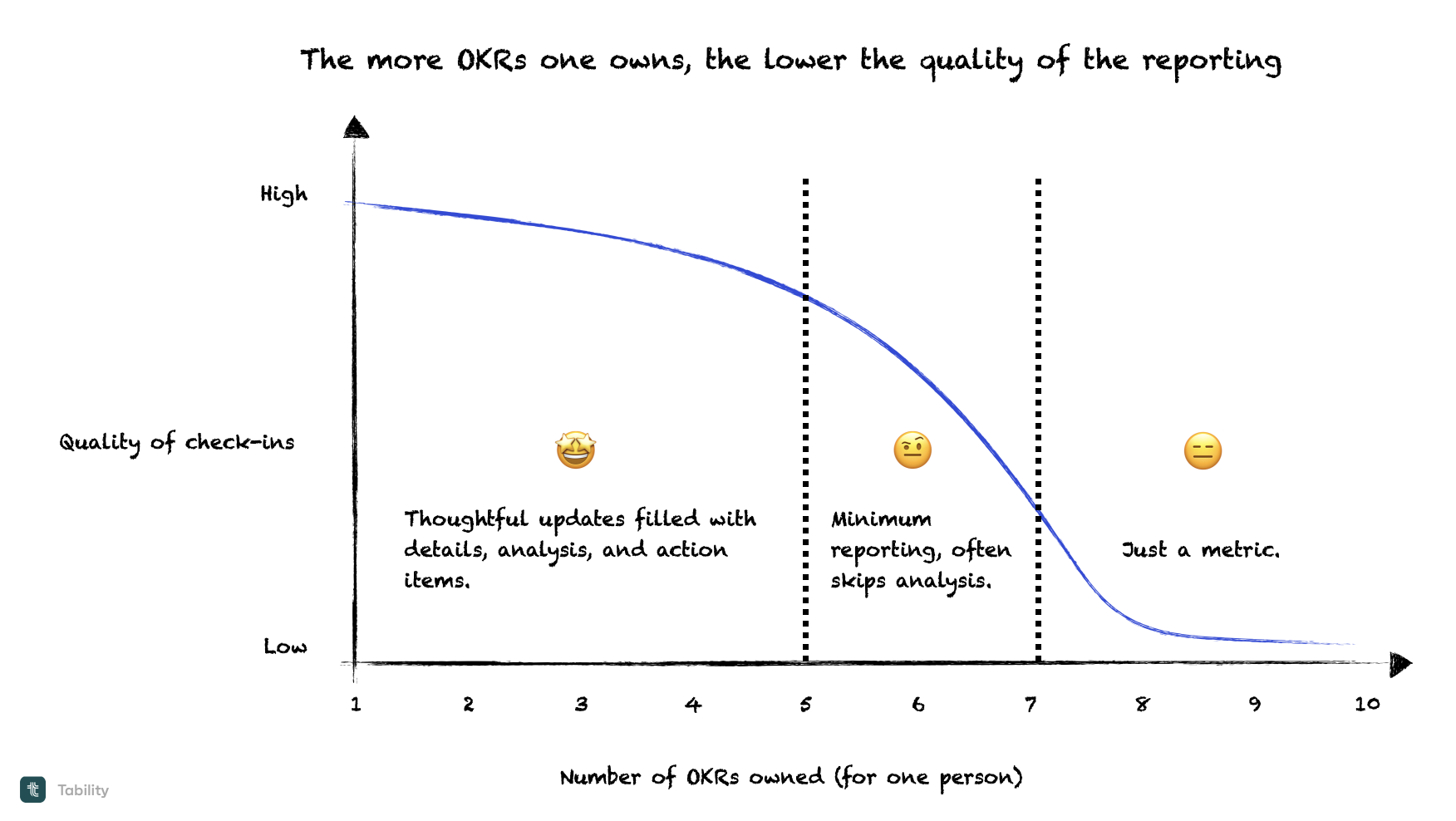A simple way to maintain focus on specific goals is to talk about them often. There's no magic involved. Repetition helps humans memorize information, and this is why we recommend weekly status reports (check-ins) for quarterly OKRs:
- It reminds everyone of the top priorities.
- It builds a shared understanding of the progress made.
- It makes it easier for teams to ask for support.
But, this is only true if the weekly check-ins are done with care. And the ratio of OKRs/owner directly impacts the quality of the check-ins.
What makes a great OKR check-in?
Reporting progress on quarterly OKRs is mainly about tracking how your Key Results are moving every week, and how confident you are about achieving your goal by the end of the quarter. In practice, this means that a good check-in should answer these 5 questions:
- Progress: where are you today?
- Expectation: is this where you're supposed to be?
- Trends: are you getting better or worse?
- Challenges: what's getting in the way?
- Plan: how are you going to move forward?
It can be a bit daunting to do with a spreadsheet, but tools like Tability can simplify the reporting by keeping track of the trends and making progress easy to capture. But, you still need to comment on expectations vs. reality and explain how you plan to move forward—as this is what makes OKRs valuable. The human feedback component of the OKRs is what makes it different from looking at KPIs. I can look up a metric by myself, but I won't be able to understand why it's at a specific value without getting context from the team involved.
Good feedback takes time
You need great check-ins to have great OKRs, and great check-ins take time.
Let's say that one of my KR is to reduce Customer Acquisition Cost (CAC) from $400 to $280. We're 3 weeks into the quarter, and this is what you read from me:
Example 1:
CAC is at $380. All good!"
It was a quick and positive read, but there are still plenty of outstanding questions:
- Is this reduction due to recent work, or is it just a normal fluctuation?
- How do we plan to reduce CAC by another $100?
- Why am I confident that we can get to $280?
- Do we need the help of others?
I don't have to write a novel, but this check-in lacks actionable information. Now let's look at the following update:
Example 2:
We're 25% into the quarter and reduced CAC by 16% (currently at $380) thanks to some low-hanging fruits work around ads.
We're now starting the heavier work to reduce it by another $100 using our Content Marketing assets as leverage. We'll need help from the Content team to update some of the layouts to increase click-through, but they're already aware of that and the first changes will be published this week.
You should expect CAC to stay flat this week, but I'm confident we can achieve our goal by the end of the quarter. Our early projections show we could get to a CAC of $250 just by optimizing existing assets."
That's a much better update to read. Not only do I know what's happening, but I can also follow up with specific questions.
So, what was the difference between the 2 status reports?
Time.
The information you need to write meaningful progress updates is already in people's heads, the tools they use, and the dashboards they track. They just need time to connect the dots and write actionable check-ins.
What's the correct ratio of OKRs/owner?

The quality of OKRs check-ins will drop significantly once an owner has more than 5 Key Results to update weekly. It will be mentally draining for them to adequately summarize what's happening while also taking care of their day-to-day work.
Ideally, you'd be able to distribute ownership of the OKRs and make sure that no one has more than 6 KRs updates to write on a weekly basis.
Another great benefit of distributing ownership of OKRs is that it'll create natural accountability and a greater sense of responsibility in the team. It's no longer about passively reading the update of a single leader and more about fostering collective achievements.
Going further
- Read our guide to OKRs check-ins.
- Read our OKR cheat sheet.
- Check out our OKRs examples.


.png)

.jpg)












